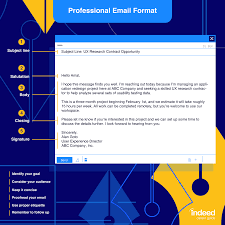Email is a powerful tool for communication in the business world. In this digital age, it has become an indispensable part of our work lives. We use it to communicate with colleagues, clients, and partners, among others. However, careless emails can lead to misunderstandings, lost business opportunities, and other negative outcomes. Therefore, it is essential to write effective and professional business emails.
Why is it important to write effective and professional business emails?
An email is the first impression that one creates on the recipient. An inappropriate email may damage the reputation of the sender and the organization they represent. It can cause confusion, frustration, and conflicts. On the other hand, if you write professional and effective business emails, you will build stronger relationships with customers, create great business opportunities, and prevent misunderstandings.
Tips for Writing Effective and Professional Business Emails
Here are some best practices to follow when writing effective and professional emails:
1. Use a professional and concise subject line
The subject line should give the recipient an idea of what the email is about. It should be short, to the point, and professional. Avoid using vague or misleading subject lines. You can also mention the urgency of your message in the subject line so that the recipient knows how important it is to read the message.
Example: Meeting request for Wednesday, 4 PM
2. Start with a proper salutation
Use a proper greeting like “Dear” followed by the recipient’s name, especially if you are addressing someone for the first time. Avoid using informal greetings like “Hey” or “Hi”. If you don’t know the recipient’s name, you can use “Dear Sir/Madam”.
3. Keep your message concise and to the point
Your email should be easy to read and understand. Avoid using big words or jargon that the recipient may not understand. Get straight to the point and avoid rambling. Use short paragraphs, bullet points, and subheadings to break down long text blocks and improve readability.
4. Use proper grammar and spelling
Spelling and grammatical errors in emails are a turn-off and can make you appear unprofessional. Use spell-check and proofread several times to ensure your email is free from errors.
5. Use an appropriate tone
The tone of your email should reflect the context of the message and your relationship with the recipient. Use a polite and professional tone when writing to colleagues and business partners. Write in a friendly and conversational tone when writing to customers. Avoid using a formal tone when writing to colleagues or friends.
6. Avoid using all caps, bold, or exclamation marks
Using all caps, bold, or exclamation marks can make your email appear aggressive and unprofessional. Use them sparingly and only when necessary.
7. Close the email properly
Use a proper closing line, like “Sincerely” or “Best regards” followed by your name and title. Always check that you have attached the necessary documents, links or other resources to support your message.
Example:
Sincerely,
John Doe
Marketing Director, XYZ Corp
Examples of Effective and Professional Business Emails
Example 1:
Subject Line: Request for meeting
Dear Mr. Smith,
I hope this email finds you well. I am writing to request a meeting with you to discuss our project updates. I would appreciate it if we could meet on Monday, 2 PM. Please let me know if this works for you.
Best regards,
John Doe
Example 2:
Subject Line: Purchase Order confirmation
Dear Ms. Torres,
Thank you for placing your order with us! We are happy to confirm that we have received it and will be processing it in the next 24 hours. We will notify you once the order ships. If you have any questions or concerns, please do not hesitate to contact us.
Best regards,
Jane Smith
Customer Service Representative
Conclusion
In conclusion, effective and professional business emails are essential tools for building strong relationships, creating great business opportunities, and preventing misunderstandings. Use these tips and examples to write emails that are concise, polite, clear, and grammatically correct. Remember to proofread your emails before sending them. Follow these tips consistently and build your reputation as a professional and effective communicator.
FAQs
The best way to start a business email is by using a proper greeting and addressing the recipient by their name.
Use short paragraphs, bullet points, and subheadings to break down long text blocks and improve readability.
Using all caps, bold, or exclamation marks can make your email appear aggressive and unprofessional. Use them sparingly and only when necessary.
Use a proper closing line, like “Sincerely” or “Best regards” followed by your name and title.
Proofreading helps to eliminate grammatical errors and spelling mistakes. It ensures that your email is professional and effective.


